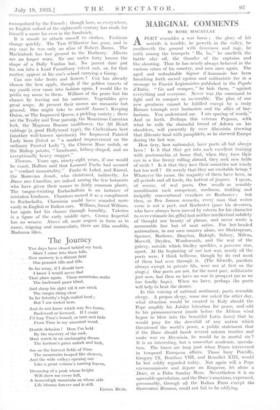MARGINAL COMMENTS
By ROSE MACAULAY
APOET resembles a war horse ; the glory of his nostrils is terrible, he paweth in the valley, he swalloweth the ground with fierceness and rage, he saith among the trumpets " Ha, ha," he smelleth the battle afar off, the thunder of the captains and the shouting. Thus he has nearly always behaved .in the various crises of his country, and now once again. The aged and redoubtable Signor d'Annunzio has been breathing forth sacred egoism and militaristic fire in a message to Fascist Legionairies published in the Popolo ••• How fiery, how nationalist, have poets all but always been ! Is it that they get into such excellent traini4 with poetomachia at .home that, when they turn their eye. in a fine 'frenzy rolling abroad, they seek new, fields of strife ? Is it that they love. their countries not wisely but too well ? Or merely that they arc excitable beings ? Whatever the cause, the majority of them have been, in all periods and all lands, the hottest of jingoes. I speak, of course, of real poets. One recalls as sensibly unmilitarist such competent., mediocre, tinkling and insipidly conventional' 'Versifiers as Rochester ; but then, as Ben Jonson remarks, every man that writes verse is not a poet, and Rochester (pace his devotees, who have always been moved by esteem for his character to over-estimate his gifts) had neither intellectual subtlety of thought nor beauty of phrase, and never wrote a memorable line but of neat satire. For hot-headed nationalism, in our own country .alone, see Shakespeare, Spenser, Marlowe,' Drayton, Raleigh, Sidney, -Milton, Marvell, Dryden, Wordsworth, and the rest of the 'galaxy, outside which Shelley sparkles,. a perverse star, apart. At the beginning of our last war, nearly all the poets were, I think bellicose, though by its end most of them had seen through it. (The Sitwells, pacifists always except in private life, were not at first on the .stage.) Our poets are not, for the most part, militaristic just now, but then we have no war in prospect (or so- we too fondly hope). When we have, perhaps the .poets will help to beat the drums.
In this voicing of national sentiment, poets resemble clergy. A propos clergy, some one asked the other day, what situation would be created in Italy should the Pope amplify his Jubilee intention for peace, and add to his pronouncement (made before the African wind began to blow into the beautiful Latin faces) that he would pray for the downfall of any nation which threatened the world's peace, a public statement that if the Duce should break several solemn treaties and make war on Abyssinia, he would be in mortal sin ? It is an interesting, but a somewhat academic, specula- tion. The times are long past when Popes intervened in temporal European affairs. Those busy Pontiffs, Gregory IX, Boniface VIII, and -Benedict XIII, would be but coldly regarded today. Not again will a Pope excommwiicate and depose an Emperor, let alone a ,Duce, at a,-Palin Sunday. Mass. Nevertheless it is an ..agreeable speculation, and the Duce's reactions, expressed, presumably, through all the Italian Press ,except the Osseriatore Romano, could not fail to be ,edifying. "Go and conquer," he bids them, "against everything and everyone. .Never , was the command to fight and to, conquer. so inexorable'. The plan of our new greatness, cannot be fulfilled except by 'a truly Roman triumph over barbarism and the allies of bar- barians. You understand. me. I am sparing of word's," And so forth. Perhaps this veteran Pegasus, Nv,411 what he calls the shameful brand of' Adowa on his shoulders, will presently fly over Abyssinia strewiag that illiterate land with pamphlets, as he strewed Enrope 'during the last war.


























































 Previous page
Previous page